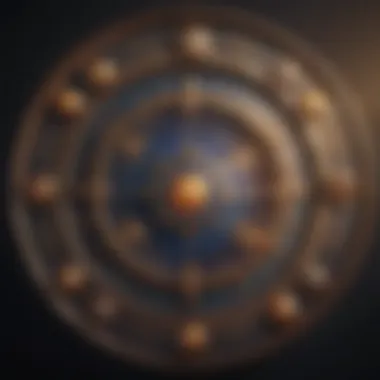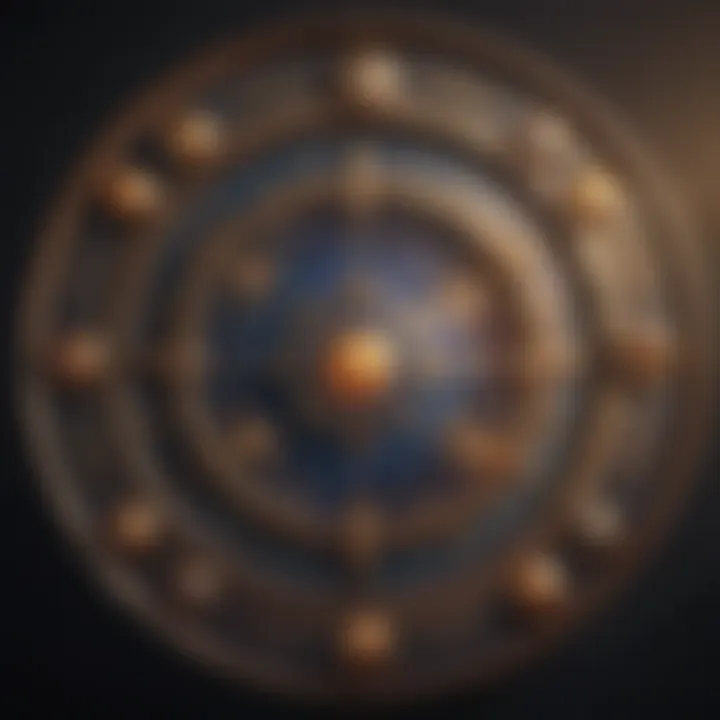Exploring Dream Meanings Through Astrology


Intro
Dreams have long fascinated humanity, serving as a canvas upon which our subconscious paints its secrets. Each night, as we drift into slumber, the mind conjures a series of vivid narratives, often puzzling and bizarre. Contributing to this mystery is the influence of the cosmos, particularly through astrology. This intersection between dreams and astrological energy invites a profound exploration that can deepen our personal insights and guide us in our waking lives.
As we embark on this journey, we will discuss various astrological concepts and their relevance to dream interpretation. Understanding how celestial bodies affect our psyche allows us to recognize patterns and meanings in our dreams, turning abstract experiences into tangible guidance. In this exploration, we aim to unveil the connections between our dreams and the skies above, shedding light on how one may navigate life's challenges more effectively through this relationship.
The relevance of this topic cannot be overstated. Insights derived from dreams often reflect our innermost desires, fears, and experiences — a treasure trove of self-knowledge. Moreover, with astrology as a lens, we can decode these experiences further, possibly revealing layers that might otherwise remain buried in our consciousness.
Whether you seek clarity from a recurring dream or wish to understand the meaning behind certain symbols, the synergy between astrology and dream interpretation offers a unique perspective. We will now delve into the foundational astrological components that shape this intricate dance of dreams and celestial influence.
Understanding Dream Interpretation
Understanding the nuances of dream interpretation is more than just a scholarly pursuit; it's a quest into the depths of human consciousness. Dreams have sparked curiosity and debate throughout history. They hold potential revelations about our inner lives and can serve as guides in a sometimes chaotic reality. By grasping the significance of this topic, readers will find themselves better equipped to decode their nocturnal narratives.
Dreams can encapsulate our fears, joys, desires, and conflicts, acting as mirrors reflecting our subconscious. This article aims to unravel how dreams intertwine with astrological influences, revealing not just personal insights but a broader understanding of universal symbols. Ultimately, the profit gained from understanding dreams links back to self-awareness. Gains in this area can aid in coping with stress, enhancing problem-solving abilities, and facilitating emotional healing.
Historical Context of Dreams
Throughout time, dreams have been emphasized across various civilizations. Ancient Egyptians, for instance, viewed dreams as direct messages from the divine. They documented these experiences meticulously, believing that interpreters were essential for unlocking their meanings. Fast-forward to the Greeks, where dream interpretation became an intricate art; figures like Aristotle pondered on their meanings, questioning the relationship between dreams and reality. In the Eastern world, Tibetan Buddhism illustrates how dreams serve as fertile ground for spiritual growth, exemplifying that everyone's character can be diversified through dream analysis.
In more recent history, Sigmund Freud introduced the idea that dreams grant access to our hidden desires and unresolved conflicts. His theories continue to influence the modern understanding of dreams, even as newer psychological methods bring diverse frameworks into play. This historical tapestry not only enriches our understanding but also highlights how dream interpretation is a continuously evolving practice.
Cultural Perspectives on Dreaming
When it comes to cultural perceptions of dreaming, it’s clear that there are substantial variances. In some Native American traditions, dreams serve a protective function, believed to be a direct communication channel with ancestors. On the flip side, in Western societies, the scientific method often overshadows mystical or spiritual analyses. Many folks might dismiss dreams as mere figments of imagination or strange nighttime stories after a busy day, while others attribute messages pregnant with meaning to each symbol and action occurring in a dream.
Different cultures also emphasize varying symbols in their dreams. For example, water often represents emotional states in many cultures, while in others, it signifies change. Understanding these cultural perspectives invites a richer appreciation of what dreams can convey, pushing us to look beyond our own understanding and acknowledging the interpretations as layered and multifaceted.
The Psychology of Dreams
The psychology behind dreams opens up another landscape that is both intriguing and vital. Psychologists study dreams to uncover layers of meaning influenced by mental states. For instance, Carl Jung introduced the concept of the collective unconscious, suggesting dreams may draw from a shared bank of experiences and archetypes. This perspective gives importance to symbols that may not just hold meaning for the individual, but resonate on a broader scale, connecting individuals across time and space.
Additionally, understanding one’s emotional state can enhance the interpretation of dreams. A dreamer feeling anxious during their waking life might often find themselves dreaming of being trapped or lost. By recognizing this connection, individuals can sift through the emotions buried within their dreams, healing them in the process.
Dreams – both historically significant and culturally variegated – pose questions that demand answers, reinforcing the idea that dreams’ meanings stretch beyond what meets the eye. As the exploration into their significance deepens, we see the rich interplay between personal experience and collective understanding. This intricate dance enriches our interpretations and reveals layers often overlooked.
"Dreams are the royal road to the unconscious." - Sigmund Freud
Understanding this interplay sets the stage for the following discussions on dream symbolism and how personal experiences accentuate these themes.
Dream Symbolism and Its Importance
Exploring dream symbolism goes beyond mere nightly escapades into the mind; it unveils a complex realm where our subconscious speaks volumes through metaphor and imagery. Understanding what these symbols signify can illuminate pathways in life, stirring a deep connection between the cosmos, our emotions, and our daily existences. This article will discuss the layers of meaning that dreams may hold and how astrology can deepen our grasp of symbology, ultimately leading us to personal insights.
Common Dream Themes
Dreams often revisit familiar themes. These recurrent images or scenarios act as universal signposts guiding us through the maze of our unconscious thoughts.
- Falling: A common thread in many people's sleep stories. It can signify feelings of loss of control or insecurity in waking life.
- Being chased: This scenario usually suggests avoidance. The dreamer may be running away from a problem, anxiety, or fear that they don’t want to confront.
- Flying: Often seen as a symbol of freedom or escape from constraints, flying can reflect aspirations or the desire for liberation from life's pressures.
Understanding these themes brings clarity, as many people share similar fears and desires, creating a sense of connection not only to oneself but also to the human experience at large. In astrology, these common themes can correlate with the position of planets during key moments in life, adding another layer of significance to the interpretation.
Personal vs. Universal Symbols
Every dreamer possesses unique symbols, deeply rooted in individual experiences and emotions. Personal symbols are often shaped by:
- Life events: Significant occurrences can give rise to symbols that might seem odd to others but are clear to the dreamer.
- Cultural background: Our upbringings color our perceptions and can create a rich tapestry of personal symbols.
On the other hand, universal symbols transcend individual experiences, anchoring in collective human experiences. For example, water often indicates emotion, while keys can symbolize access or control. The blend between personal and universal symbols makes dream analysis a nuanced task. It requires considering the dreamer's context, astrological influences, and emotional states for a comprehensive reading.
The Role of Emotions in Dreams
Emotions are the heartbeat of dreams. They essentially breathe life into the symbols, guiding interpretations and shedding light on unresolved issues. Emotions in dreams are not blunt; they come with layers.
- Fear: An emotion that often manifests in dreams, indicating fears we may not confront. These fleeting shadows remind us of what lies beneath the surface.
- Joy and Contentment: Such positive emotions can reflect a period of growth or happiness, signaling that you're in tune with your desires.
- Sadness or Anger: Dreams that evoke these emotions can prompt self-reflection, urging one to explore underlying feelings.
Understanding emotional context is important when interpreting dreams. It helps in correlating these feelings to specific symbols and astrological influences, framing a clearer narrative of the dream experience.
This insight into the interplay of emotions and dreams underscores how they serve as mirrors reflecting our internal world, and astrology can enhance the clarity of these reflections.


Astrology and Dreams: A Cosmic Connection
Astrology and dreams share a profound link that can offer unique insights into our subconscious mind and the universal forces that may influence it. While dreams often reflect personal emotions and experiences, they can also be shaped by the celestial bodies that govern our zodiac signs and astrological houses. This interconnectedness suggests that understanding astrology may enhance our ability to interpret dreams, revealing deeper meanings that could guide us on our life path.
Celestial Influences on Dreaming
The cosmos is always at play, influencing our thoughts, actions, and even our dreams. The positions of planets, stars, and moons can act like a symphony conducting our subconscious, leading to dreams that resonate with our current emotional states or life circumstances.
For instance, during a full moon, many people report vivid dreams that often revolve around themes of release or closure. This phenomenon occurs not just because the moon is visually prominent, but its energy is palpable, stirring something deep within us. Evidence suggests that celestial energies are like a ripple effect—what happens above might echo within. A few key celestial influences include:
- Planetary Movements: When certain planets transit through our houses, they can create a backdrop for our dreaming experience. For example, Mercury's retrograde might stir up past issues, resulting in dreams involving unresolved matters.
- Zodiac Signs' Characteristics: Each zodiac sign brings unique traits that can appear in our dreams. An Aquarius might dream about unusual inventions and futuristic concepts, while a Cancer might find themes centered around home and family.
The Moon’s Phases and Dream Activity
The moon's phases hold a special place in dream interpretation. Each phase seems to influence the type of dreams we may have.
- New Moon: This phase signifies new beginnings. Dreams may focus on aspirations and fresh starts.
- Waxing Moon: Dreams here can encourage growth, manifesting desires that align with one's current trajectory.
- Full Moon: A time often linked to heightened emotions and significant revelations. Vivid and sometimes chaotic dreams can occur, making it easier to spot underlying issues that need addressing.
- Waning Moon: This phase is about release and letting go. Dreams might reflect a need to purge outdated thoughts or feelings.
Understanding these moon phases helps individuals align their dream work with broader cycles of change in their life, making each dream more relevant to their current journey.
Planetary Aspects and Their Impact on Dreams
Planetary aspects refer to the angles formed between planets in the natal chart, and they can bring certain energies into the dreaming mind. When two planets are harmonious, you might find dreams filled with inspiration and creativity. Conversely, challenging aspects can lead to dreams filled with conflict or confusion.
Consider a few key aspects:
- Conjunction: This signifies powerful energy and can lead to prolific creative dreams. If Venus is in conjunction with Neptune, you might have dreams filled with romance and artistry.
- Square: This aspect often brings tension and conflict. Dreams might reflect worries or unresolved conflicts, often surfacing the stress in our waking life.
- Trine: Beneficial aspects tend to produce dreams that offer solutions or insights, perhaps providing clarity on an issue you've been wrestling with.
Astrology acts as a lens through which we can decode our dreams, allowing us to explore the symbiotic relationship between celestial events and our psyche.
Understanding these celestial influences may offer transformative insights. It is suggested to track your dreams along with astrological events to uncover patterns and deepen your dream interpretations.
By bridging the gap between these two realms, we can better navigate our dream narratives, interpreting them through the cosmic lens of our astrological identities.
Personal Reflection Through Dreams
Dreams often serve as a mirror, reflecting our inner thoughts, emotions, and experiences. They can provide insights that we may overlook during the hustle and bustle of daily life. Understanding the significance of dreams fosters not only personal growth but also self-awareness. In this section, we dive into the importance of personal reflection through dreams, exposing the treasure trove of understanding waiting within our subconscious.
Analyzing Your Dream Journal
Keeping a dream journal can be a true game changer. This practice involves recording your dreams as soon as you wake up. Write down every detail you can remember, from emotions to symbols and characters involved. Over time, patterns may emerge, drawing connections between your dreams and your waking life. For instance, a recurring theme of bridges might symbolize transitions or changes you are facing.
- Benefits of maintaining a dream journal:
- Enhances dream recall
- Aids in recognizing patterns
- Clarifies emotional states
- Facilitates deeper self-reflection
Moreover, reviewing past entries can be enlightening. As you compare your dreams to your life situations, you might notice how specific dreams lined up with events or challenges. This revelation can guide you in overcoming current obstacles.
Connecting Dreams to Daily Life
Dreams aren’t just whimsical stories; they often serve as a bridge to understanding your daily existence. By connecting the dots between dream content and real life, you can uncover hidden insights. For instance, dreaming about losing your wallet might indicate feelings of insecurity or loss of control.
- Tips for connecting dreams to your waking life:
- Reflect on emotions felt in the dream and their real-life parallels.
- Consider daily worries or stressors that may manifest during your dreams.
- Look for personal symbols that echo broader themes in your life.
The exploration of your dreams can reveal unresolved issues or underscore desires that need attention. By actively making these connections, you empower yourself with better tools for managing life’s challenges. Your dreams are trying to tell you something; it’s worth listening.
Understanding Recurring Dreams
Recurring dreams often arise when there’s something unresolved lingering in our subconscious. Have you experienced the same dream over and over? Perhaps it’s a sign that you need to confront a life situation or internal conflict.
- Common themes in recurring dreams may include:
- Falling or losing control: Often indicative of anxiety or fear.
- Finding oneself naked in public: Reflecting vulnerabilities or feelings of exposure.
- Being chased: Signifying avoidance of difficult situations or emotions.
By recognizing and reflecting on these dream patterns, you can open avenues to healing and self-discovery. Understanding why you experience certain recurring dreams may allow you to find closure in your waking life.
Recurring dreams are a prompt from your subconscious to take action. Ignoring them may lead to prolonged discomfort.


In sum, personal reflection through dreams isn't a mere afterthought; it’s a profound element of understanding one’s self and navigating the complexities of life. Driven by analysis, reflection, and connection, this process serves as a means to better grasp not only our dreams but also our realities.
The Role of Astrology in Personal Dream Meaning
Astrology and dreams share a unique relationship, infused with layers of meaning and personal significance. Understanding your dreams through an astrological lens can bring forth a deeper comprehension of your inner self, illuminating various aspects of one’s life. With the celestial bodies constantly in motion, their positions at the moment of your birth influence not only your personality but also the dreams and thoughts you may experience. This connection acts like a cosmic map, guiding individuals in deciphering their night-time narratives.
Several key elements underscore the relationship between astrology and dream interpretation:
- Personal Insight: Recognizing how astrological influences shape your dreams can lead to profound personal revelations, helping you navigate your day-to-day life more effectively.
- Contextual Relevance: Navigating one’s dreams via astrological tools enriches the interpretation process, placing symbolism within a broader context.
- Predictive Abilities: Certain celestial events can hold sway over your dream activity; understanding these patterns may unveil future possibilities or challenges.
Zodiac Signs and Their Dream Influences
The zodiac signs each possess distinct energies that can express themselves in dreams differently. Each sign resonates with particular themes, which can manifest as symbols or scenarios within your subconscious. For instance, a dream involving conflict might align with the assertive qualities of Aries, while a nurturing scene may draw from Cancer’s emotional depth.
Consider the following examples:
- Aries: A dream about a race might suggest ambition or competition.
- Taurus: A vision of bountiful harvest can signal abundance or stability.
- Libra: Imagery of harmony and balance could reflect a quest for relationships or fairness.
These associations can be employed to analyze your dreams in relation to your zodiac sign, providing personalized meaning based on astrological influences.
Astrological Houses and Dream Themes
Astrological houses represent various life areas, each resonating with specific themes. When examining your dreams through the lens of these houses, patterns can emerge, giving substance to your experiences. For example:
- 1st House (Self): Dreams regarding personal identity, image, or self-expression.
- 4th House (Home): Visions that evoke familial ties or the concept of shelter.
- 7th House (Partnerships): Dreams centered around relationships, negotiations, or contracts.
Recognizing which house's energy plays into your dreams can clarify what personal issues are surfacing and encourage deeper self-reflection.
Transits and Their Relationship to Dreaming
Astrological transits are the movements of planets relative to your natal chart, and they can significantly impact your dream experiences. Each transit brings unique energies that can elicit specific dream themes. For example:
- Mercury Transits: These can enhance communication in dreams, uncovering hidden messages.
- Neptune Transits: Often lead to deeper, more symbolic dreams, tapping into the subconscious layers.
- Saturn Transits: May bring dreams that provoke feelings of restriction or responsibility, prompting introspection.
Keeping track of current astrological transits alongside your dream journal may reveal fascinating correlations between your outer and inner worlds.
"A deeper understanding of your dreams can be the compass that guides you through the maze of life, illuminated by the stars above."
Through these astrological considerations, dreams become not just fleeting images but rather a tapestry woven from the threads of your personal and cosmic journey.
Common Dream Scenarios and Their Meanings
Understanding common dream scenarios is crucial when diving into the realms of both dream interpretation and astrology. These scenarios often act as keys, unlocking the profound messages our subconscious is trying to convey. By exploring significant themes like falling, flying, and being chased, et cetera, one can gain a clearer insight into their internal world. Each dream scenario not only highlights personal fears and desires but may also reflect broader astrological influences that engage with one's psyche.
When examining these dreams through the lens of astrology, the intricate tapestry of celestial movements might reveal deeper meanings behind reoccurring narratives. Notably, it's beneficial to recognize how these common experiences can serve as mirrors, reflecting personal journeys and guiding individuals toward self-discovery and healing.
Falling and What It Represents
Falling in a dream often stirs an array of emotions—fear, insecurity, and sometimes even liberation. This scenario can be interpreted in several ways depending on the context of the fall. Many psychologists and dream analysts suggest that falling symbolizes a loss of control or feelings of helplessness in waking life.
From an astrological perspective, this dream might align with significant transits or aspects, particularly involving planets that influence personal stability, such as Saturn or Uranus. If someone is experiencing turbulent periods during a Saturn return, for instance, this may manifest in dreams of free-falling, signaling a need to reassess one's foundations or a fear of the unknown.
Furthermore, falling can also signify a release—the act of letting go of outdated beliefs or burdens that one holds onto tightly. Thus, the emotional narrative of falling can vary widely, and each individual must consider personal experiences and astrological influences to decode its meaning.
Flying: Freedom or Escapism?
Dreaming of flying resonates deeply with many, stirring feelings of elation and euphoria. However, the meaning behind this liberating experience can vary. For some, flying represents a powerful sense of freedom, the ability to transcend limitations, and explore the true self. This theme is particularly poignant for those feeling constrained in their waking lives.
Conversely, flying can also be interpreted as an escape mechanism. Astrologically, the influence of Jupiter, the planet associated with growth and expansion, may play a role in dreams of soaring through the skies. On the flip side, if one feels weighed down during these flights, it may signal an escape from unresolved issues or an inability to face certain challenges, potentially reflecting a Uranian influence of abrupt change.
Whether viewed as empowerment or avoidance, the nuances of flying dreams underscore the necessity of introspection. It's essential to analyze underlying motivations for these experiences and discern if the dream guides individuals toward liberation or merely serves as a temporary getaway.
Being Chased: An Analysis
Dreams of being chased tap into the primal instinct of fear. Often representing something the dreamer may be avoiding in real life—such as responsibilities, fears, or unresolved conflicts—this scenario can take many shapes. The pursuer might be a person, an animal, or even an abstract force reflecting inner turmoil.
Astrologically, this dream could emerge during notable transits where planets create tension in one's personal or relational aspects of life, like squares from Mars or Pluto. Such experiences can highlight a need to confront what one fears most and suggest that transformation often lies beyond those fearful shadows.
Understanding the nuances of the chaser's identity can also add layers to the interpretation. Are they a representation of someone from your past, or are they embodying traits you'd like to avoid?


Ultimately, being chased in a dream signals not only the existence of imminent pressures but also a call to address areas of life requiring attention. By closely examining the nature of the chase and its astrological backdrop, one might unearth paths toward personal growth and clarity.
In dreams, common scenarios serve as reflections of our psyche, enriched by the celestial patterns that guide us.
Interpreting Dreams with Astrology
Understanding dreams through the lens of astrology offers a profound exploration into both the subconscious and the cosmic forces that govern our lives. By merging the insights from our dreams with astrological frameworks, we can dive into a rich tapestry of meanings. Dream interpretation isn’t just a passive reflection; it becomes an active engagement with celestial energies that shape our waking and sleeping states.
Astrology provides a unique blueprint for interpreting dreams. Each sign, planet, and aspect can influence the themes and symbols that occur within dreams, offering a nuanced layer of understanding. For those who seek deeper insights into their personal development, using astrology as a lens to analyze dreams can illuminate pathways and unveil personal challenges or potentials.
Consideration of these astrological elements can also unlock specific questions and insights about our lives. For instance, a full moon may amplify our emotional state during dreams, while Mercury in retrograde could signify communication-related themes coming up in our dream narratives.
As dreams often encapsulate personal experiences, integrating astrological insights transforms dream interpretation into a holistic practice. Incorporating astrology allows one to tap deeper into the emotional patterns linked with celestial events, unveiling layers of meaning that standard dream analysis might overlook.
Using Birth Charts for Dream Analysis
A birth chart is a snapshot of the heavens at the precise moment of an individual's birth. When analyzing dreams, these charts act as personal guides, linking dream symbols back to the individual's life path, emotional landscape, and even challenges.
- Personal Planets: The sun, moon, and rising signs shed light on the core aspects of one’s personality. For instance, a Leo sun may experience dreams characterized by themes of leadership or creativity, while a Cancer moon might explore emotions and family connections.
- Transiting Aspects: Understanding how current transiting planets relate to natal planets can deepen the interpretation of dreams. If Saturn is squaring the natal sun, one may find themselves dreaming about responsibilities or struggles that reflect that tension in waking life.
Astrological Transits and Their Timing in Dreams
The timing of astrological transits can significantly impact dream content and clarity. For instance, during eclipses, dreams often reveal deep insights related to change and transformation. Perhaps they bring forth unresolved issues or new beginnings that need to be addressed.
In general:
- Mercury Retrograde: May result in communication issues surfacing in dreams. Existing relationships or unresolved matters might take center stage.
- Neptune Transits: Often lead to vivid dreams, blurring the lines between reality and imagination, inviting exploration into spiritual realms.
Monitoring these transits helps practitioners pinpoint when to expect dream revelations, facilitating a proactive approach to understanding personal growth.
Astrology Resources for Dream Interpretation
There are a plethora of resources at one’s disposal when it comes to marrying dream interpretation and astrology:
- Books and Guides:
- Online Forums and Communities: Participating in platforms like Reddit’s r/astrology can provide diverse perspectives on common dream themes and symbols.
- Astrological Software and Apps: Tools such as AstroSeek or Astro.com can be useful to generate birth charts and track transits effectively.
- Workshops and Seminars: Organizations often offer events focusing on dream work and astrology, providing hands-on experience and communal learning.
- The Dreamer's Dictionary by Gwen de L. G.
- Astrology for the Soul by Jan Spiller
Connecting dreams with astrology is akin to reading a cosmic map — one that, when explored thoughtfully, can reveal not only personal truths but also a clearer perspective on the journey through life.
“Dreams are the royal road to the unconscious.” – Sigmund Freud
Through this syncretic approach of intertwining dreams and astrological insights, practitioners may discover a wellspring of guidance that sheds light on their personal paths and future endeavors.
Practical Techniques for Dream Exploration
Dream exploration can feel like peeling an onion—layer after layer reveals more about our inner selves. For those delving into the world of dreams, understanding techniques that enhance our experience can offer profound insights. The significance of practical techniques lies not just in the content of our dreams but also in how we engage with and interpret them. The right methods can illuminate connections between our subconscious and external realities, thus fostering personal growth.
Techniques for Enhancing Dream Recall
Many people wake up in the early hours with vivid dreams, only to forget them before breakfast. Enhancing dream recall requires some intentional strategies. Here are a few techniques to try:
- Keep a Dream Journal: The classic approach. Keeping a journal by your bedside allows you to jot down dreams as soon as you wake. The act of writing reinforces memory.
- Set Intentions Before Sleeping: Tell yourself to remember your dreams while you're drifting off. This mental cue can have a surprising impact on recall.
- Stay Still After Waking: Moving too quickly can erase dreams like a sandcastle hit by a wave. Take a moment to stay still and reflect upon any lingering images before leaping out of bed.
These actions help cultivate a deeper relationship with one’s dreams, turning fleeting moments into lasting memories.
Meditation and Its Effect on Dream Clarity
Meditation is often seen as a key to a clearer mind. It also plays a role in dream clarity. Taking time to meditate can slow down the mental chatter, allowing for a clearer channel to receive messages from dreams. Consider these points:
- Deep Breathing: Engaging in deep breathing exercises before sleep encourages relaxation and can lead to more vivid dreams.
- Mindfulness Practices: Being present can enhance awareness of the micro-stories we experience while dreaming. Mindfulness creates a bridge to understanding our subconscious thoughts.
- Guided Meditations: Using specific meditations focused on dreams may help in connecting with symbolism and emotions embedded within dreams.
By intrepidly exploring meditation, one may uncover more profound layers of meaning in their dream beliefs and symbols.
Utilizing Crystals for Dream Work
Crystals are often associated with various aspects of spirituality. When it comes to dreams, certain stones are believed to amplify dream experiences. Here are some gemstones you might consider incorporating into your nightly routine:
- Amethyst: Known for its calming properties, amethyst may facilitate protective guidance in dreams.
- Lapis Lazuli: This deep blue stone is traditionally believed to enhance intuition, and placing it beneath your pillow could lead to clearer dream messages.
- Moonstone: Aptly named, moonstone can assist in connecting to lunar energies, promoting emotional balance and dream insight.
By thoughtfully integrating crystals into dream practices, individuals can elevate their dreaming experiences, contributing to richer narratives and greater self-awareness.
"Dreams are the royal road to the unconscious." - Sigmund Freud
Incorporating practical techniques into dream exploration allows perplexing dream narratives to gain clarity and personal relevance. Such methods foster an ongoing dialogue between the conscious and subconscious, enabling deeper insights into the self, guided by celestial energies and personal reflections.







